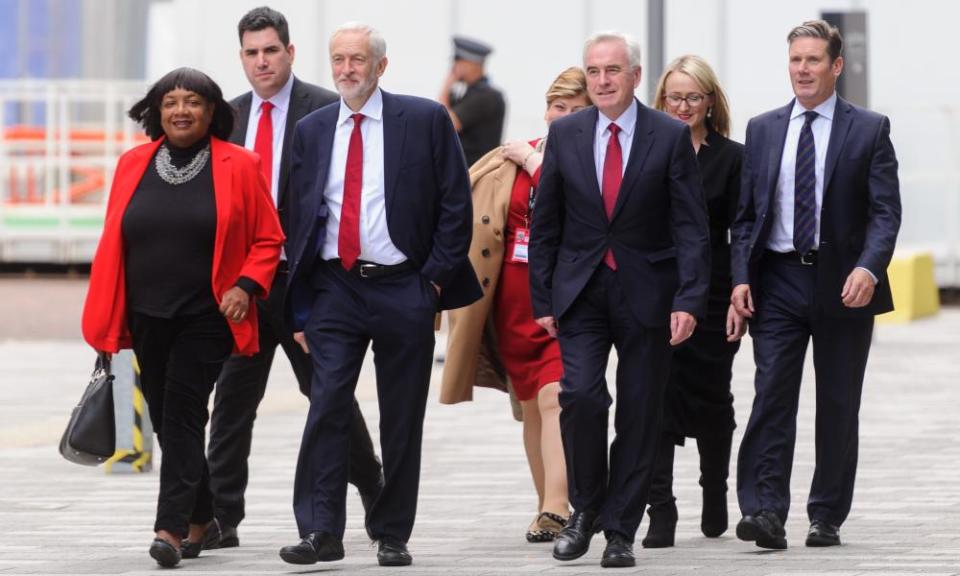Labour must prepare itself now for a second referendum

The traditional critique of the Labour left went something like this: it was made up of purists, more committed to principle and protest than power, unwilling to reach beyond its core vote to listen to the concerns of the swing voters it must attract in order to govern.
There is some irony, then, that those who peddled this narrative now loudly say the opposite – that the Labour leadership is made up of unprincipled triangulators, sidelining their remain “core” vote, failing to turn up to anti-Brexit protest marches, failing to ensure clear red water separates them from the Tories. It is as though Jeremy Corbyn has a big red “Stop Brexit” button in his possession that, out of spite, he refuses to press.
The Tories are of course in the midst of their worst internal crisis for more than a century. The rebels failed to displace Theresa May, leaving her humiliated and weakened, but they’re now stuck with her for a year. Her deal is dead. Her announcement that she won’t lead the party into a hypothetical 2022 election means a de facto leadership race will now commence. The threat of a split is real. And yet anxiety stalks Labour’s ranks.
At the general election, Labour flourished by painting an insurgent manifesto in primary colours: taxing the rich to invest in the economy, scrapping tuition fees, nationalising key utilities, and so on. A “people versus the elite” populism resonated, and both Labour and Corbyn’s initially catastrophic polling soared. It worked because Labour refused to make it the Brexit election May desired.
But when Brexit dictates the news agenda, Labour loses its sense of insurgency. The party’s leading lights end up looking like overly cautious, tinkering politicians, tangled up in jargon about customs unions and strong single-market relationships, rather than streetfighting radicals. Inevitably it drains the enthusiasm that powers the entire Corbyn project. Then there’s the fact that all prospective options have unattractive downsides. A divisive referendum that aggravates leave voters in the north and Midlands? Backing an amended Tory deal that bails out May? A general election in which Labour wins a small majority, leaving it permanently at the mercy of a small group of hostile backbenchers while lumbered with the whole Brexit mess?

Labour must continue to prioritise an election, and that means resisting overtures from May. As well as the need to address the injustices that drove the Brexit result, Britain has to be liberated from the endless Tory psychodrama. Calling for a vote of no confidence in the government now would fail, and those – in the SNP and on Labour backbenches – demanding one know it. They want it out of the way so a new referendum becomes the priority.
The arithmetic may change: if the DUP tires of May refusing to drop a backstop it considers more of a threat to the Union than a Corbyn government; or if ultra-Brexiteers – now unable to stage an internal coup – decide a parliamentary vote of confidence is the only means of displacing May; or if May realises an election is the only way out.
Talk of an election inevitably prompts Labour’s “centrist” critics to highlight the deadlocked polls. A standard question is: “Why isn’t Labour 20 points ahead of a disastrous Tory government?” But they rarely ask why remain isn’t 20 points ahead of a disastrous Brexit project, because the two statistics are linked. The Tories have an artificially high floor because leave voters trust them most to deliver Brexit. Labour must again shift the narrative away from Brexit to domestic policy. That will be harder this time – but it can be framed as answering the disillusionment that led to the result in the first place.
But the party must prepare for a referendum, too. Those on the left who have resisted calling for one are often accused of failing to do so out of partisanship, rather than an awareness of the demons unleashed by the first referendum, and a fear even worse monsters will emerge during a second. With no dramatic shift in polling, a leave campaign that urges voters to “tell them again”, angrily decrying remainers for refusing to accept the first result, may win again. The resulting rhetoric will make “enemies of the people” and “traitors” look tame.
Centrists stake their hopes of a political rebirth on the remain cause. In the last referendum, they wheeled out corporate titans and City types, ignoring polling that showed the public had thought Ed Miliband’s Labour was too soft on big business by 42 to 22 a year earlier.
But there are potential opportunities, too. Labour could tell its leave voters it did everything possible to make Brexit work. It could say the message had been sent, and remain would mark the start of a rebuilding of Britain. It could present its manifesto as a cure to the ills that drove the 2016 upheaval. It could paint the Tory Brexiteers as the establishment. With a new left-leaning government in Spain, a major EU nation, it could point to a powerful ally for a message of “remain and reform”.
Labour would have the advantages that boosted it in the 2017 election – such as mass mobilisations across the country and broadcasting rules that grant direct access to the public. The Tories may well shred themselves in such a campaign, and an election highly advantageous to Labour may follow.
Such an outcome is fraught with risks, and may unleash Britain’s darkest postwar chapter yet, but if it becomes the last option standing, then it must be prepared for now. Tory bloodletting lends itself to schadenfreude, but resist it, because there is much pain to come, and there are no easy ways out for Labour or the country.
• Owen Jones is a Guardian columnist

 Yahoo News
Yahoo News 